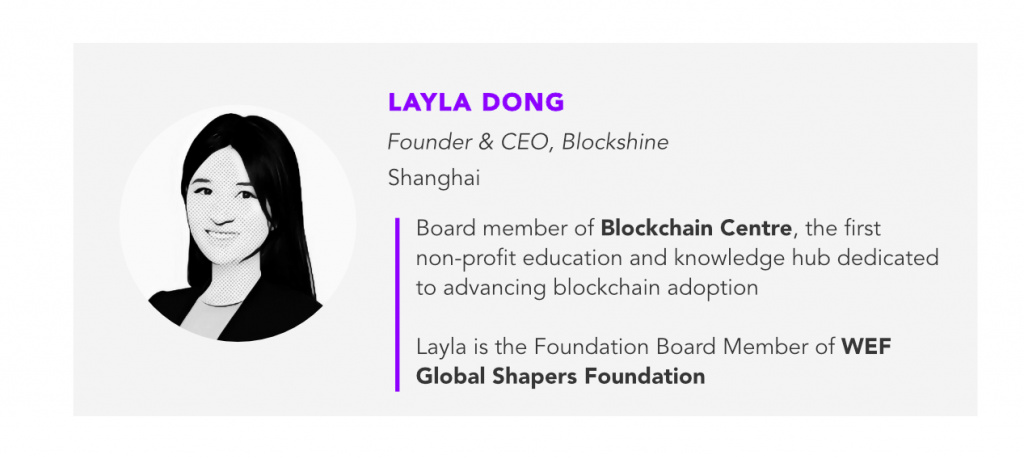‘China’s developers aren’t most creative,’ but there’s power in numbers to excel
China’s enormous market of 1.4 billion people means there is a large pool of human resources that can drive blockchain development and adoption, especially in the wake of endorsement from President Xi Jinping. Blockshine founder and CEO Layla Dong explains how China’s burgeoning market can boost blockchain development.
China’s large pool of human resources can boost blockchain development and adoption in the country, according to Blockshine founder and CEO Layla Dong.
“As Chinese, we’re probably not the first- or early-stage adopters for a lot of the other technologies, such as AI and IOT. However, we have a large market — it’s the element that can help us to grow technology very fast compared to a lot of early-adopter countries,” said Dong.
Key Highlights

- “As Chinese, we’re probably not the first- or early-stage adopters for a lot of the other technologies, such as AI and IOT. However, we have a large market. So the large market, it’s the element that can help us to grow that technology very fast compared to a lot of early-adopter countries.”
- “Chinese enterprises are actually waiting for some of the mature use cases coming from overseas. They want to see in the consumption area, what Unilever are going to do with adopting blockchain. In e-commerce, what’s Amazon going to do with blockchain. Then they’re probably the second group of adopters of blockchain. But however, we can grow very fast because the market is large.”
- “If people are saying that blockchain is the next stage of the Internet, then when you have some good things you want to experiment with, you come to the biggest market. So I would welcome everyone with passion, with ideas, with great technology: Come to China, work with us.”
Blockshine provides blockchain-related consulting services and solutions to enterprises in a variety of industries.
There has been a surge in jobs, investment and development in the blockchain industry in China in recent years, culminating in Chinese President Xi Jinping‘s endorsement of the technology in October.
A Forkast.News analysis of LinkedIn profiles in China published in the China Blockchain Report discovered that were 5,290 blockchain developers in the country in 2019, up from 3,780 in 2018.
Read more in the China Blockchain Report
“We can see that from an innovation perspective, Chinese developers are not the most creative developers in the world. But they are very good with key performance indexes,” said Dong. “If you give them some work to do, they’ll never leave the office until they complete it. But they are not very strong at the creative side.”

China’s developers are relatively young and inexperienced, according to a survey by Alibaba in 2017, with 56.7% of respondents having 0-3 years of work experience. However, 42% of international developers said they had the same amount of experience.
Nonetheless, the number of internet users in China reached 802 million in 2018—a penetration rate of 57.7% according to a report by state agency China Internet Network Information Centre. Chinese developers’ relative inexperience may not be an obstacle to technological development and adoption if penetration rates increase over time.
“Chinese blockchain talent has been evolving as new features and functionality that [Baidu, Alibaba, and Tencent], the large tech giants in China, build as well,” said Sam Lee, CEO of investment firm Blockchain Global.
See related article: How Chinese talent is driving a boom in blockchain investment
“So, if you look at the velocity of capital in China, it’s faster than anywhere else in the world not only because of the population density, but also due to the digitization of value. And now this kind of experience would increase the economic activity in any country that adopts it,” said Lee.
Blockshine has partnered with education and knowledge hub Blockchain Centre, which Lee founded in 2014.
Forkast.News Editor-in-Chief Angie Lau sits down with Blockshine Founder and CEO Layla Dong to learn about how China’s burgeoning market can boost blockchain development.
Full Transcript
Angie Lau: Helping us understand China a little bit better is Layla Dong. She is CEO of Blockshine, which focuses on social impact in the blockchain industry. But the reason why I want to sit down with Layla is because you can really help us understand the context of how China got here.
You grew up in Dalian. Once upon a time, there was no Internet, there were no computers, there was no mobile technology. Today, we are now engulfed in technology in China. It is one of the leading edge innovators when it comes to fintech. And now with blockchain, where can China lead in blockchain, and what do you see?
Layla Dong: I think like all the other technologies, as Chinese, we’re probably not the first- or early-stage adopters for a lot of the other technologies, such as AI and IOT. However, we have a large market. The large market, it’s the element that can help us to grow that technology very fast compared to a lot of early-adopter countries. I think that’s the differentiating point of how China has always been a leading marketplace for a lot of technologies.
Angie Lau: We have heard how quickly blockchain itself fundamentally evolves, in even weeks and days, the sprint can be very, very fast. That speed is also in proving the case, proving the technology and proving our enterprise, right?
Layla Dong: Yes. So when we talk about blockchain in China, we have two different perspectives. So obviously, there are a group of people that are fascinated about cryptocurrency, how to make money from all the different coins and tokens. But there’s the other side. So the other side, including the government and enterprise, they want to know, when everybody all over the world talk about the implementations and the potential of that technology, but from the government’s side, they haven’t seen much.
They haven’t seen real use cases of the enterprise. They haven’t seen a good example that really helps them to increase the efficiency of their work. So they’re struggling, but learning at the same time. But luckily, I think from late last year, we started to see some of the potential use cases. I wouldn’t say very mature-stage use cases, but at least we started. Companies including Ant Financial and startup companies like us I think we’re at the frontline of trying, and adopting, and promoting, educating people for them to accept this new technology.
Angie Lau: What’s happening on the front lines right now that excites you?
Layla Dong: I think I have to say some of the government cases, [which] are much faster than what I expected from the government’s side. The reason behind that is, I think, because currently the global economy is going down, slowing down a little bit. A lot of big companies, they’re actually struggling with their daily operations, across the world.
Right now, the only entity, or the only party, that has the readiness and enough resources to support adopting something new, is actually the public sector. That’s why we see some good use cases out of the U.N., out of the World Economic Forum, from the Chinese government, even the Dubai government, I think the public sector, in this economic environment, will grow faster in terms of adopting the technology because they have the resources and money.
Angie Lau: So you’re talking about, really, the smart city revolution.
Layla Dong: The smart city revolution, I think Dubai is already on that track. Their goal for 2023 is, all the government authorities adopt Blockchain for different authorities to connect. So they’re going to do decentralized, but also shared databases to drive that. Well in China, we can see some good use cases as well, but I think the government is keeping at a quite a, I wouldn’t say secret, but early stage. But I know they’re doing a lot of work underneath, just to be prepared.
And also the enterprises are looking at adopting the technology, but they are waiting, especially the Chinese enterprises, they’re actually waiting for some of the mature use cases coming from overseas. They want to see in the consumption area, what Unilever are going to do with adopting blockchain. In e-commerce, what’s Amazon going to do with blockchain. Then they’re probably the second group of adopters of blockchain. But however, we can grow very fast because the market is large.
Angie Lau: If there was one thing that people perceive about China that you want to correct or illuminate, what would that be, about blockchain technology and what’s happening here in the China space?
Layla Dong: So I want to say, if you have some brilliant ideas which you want to experiment with, come to China and maybe you can work with us. We have such a mature market for fintech. The e-commerce and Internet culture in China, I think is way more advanced than many of the other countries in the world.
And of course, if people are saying that blockchain is the next stage of the Internet, then when you have some good things you want to experiment with, you come to the biggest market. So I would welcome everyone with passion, with ideas, with great technology: Come to China, work with us.
Angie Lau: Do you think the talent pool in China is different, or bigger, or more educated, or more experienced? How would you describe the developer talent pool here?
Layla Dong: The developer talent pool is quite different. So we’re working with some companies in the States, in Switzerland as well. We can see that from an innovation perspective, the Chinese developers are not the most creative developers in the world. They can’t be the most creative ones. But what they are good at is, they are very good with KPIs. If you give them some work to do, they’ll never leave the office until they complete it. But they are not very strong at the creative side.
So I think that’s a great collaboration. I feel great potential for Western developers [who] are more creative, more passionate, I wouldn’t say smart[er], but want to try new things. But also with the Chinese developers, we have a very, sustained, and strong, and hard-working culture. I see a great combination of the two.
Angie Lau: It’s a perfect yin and yang, win-win for a decentralized industry.
Layla Dong: Definitely a win-win.
Layla Dong: Thank you.
Angie Lau: Thank you so much.